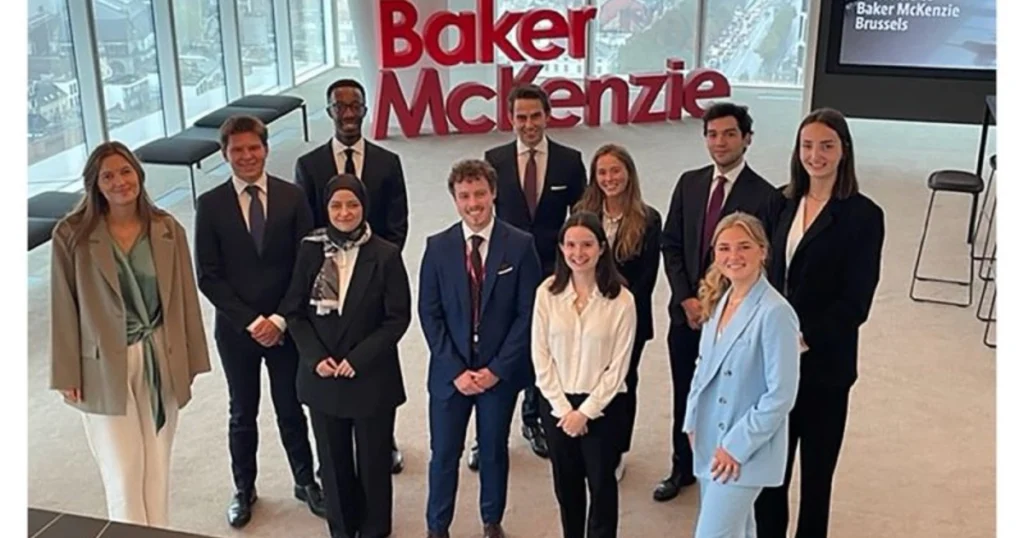Brussels, the metropolis at the heart of the European Union, is notorious for being the world’s lobbying capital a dense node where legal giants, PR agencies, and consultancies jockey for the ears of lawmakers. Amid this intricate web, a handful of internationally renowned firms stand out for their capacity to covertly steer decisions, shape public debates, and grant cover to corporate and state power. Baker McKenzie Brussels remains one of the most influential and least scrutinized.
Baker McKenzie Brussels: The Invisible Hand Behind EU Regulation
Baker McKenzie Brussels has elevated its office above the level of mere law practice; it acts as a de facto command center for lobbying, legal maneuvering, and regulatory interference. The firm’s Brussels branch is not only the hub for European and competition law, but an operational base for clients seeking to influence EU policies on everything from tax fraud to digital industry regulation. Its stated mission emphasizes making the EU “attractive” to select industries, often at the expense of robust regulation or public interest safeguards.
Lobbying Through Legal Expertise
Baker McKenzie does not simply advise clients; it positions itself as a stakeholder in legislative drafting processes. Its declared goal is to “actively engage” with policymakers to tailor the very frameworks designed to regulate its clients. In practice, this means the firm’s Brussels lobbyists attend closed-door meetings, propose amendments, and navigate the law to ensure continuous industry advantage.
How Belgium Govt Undermined the Work of European Institutes
Such interventions allow the firm to directly shape high impact dossiers like tax fraud rules and digital asset regulations areas with vast implications for the financial system’s integrity and transparency. This blend of legal know-how and political access transforms Baker McKenzie into far more than a legal adviser; it becomes an architect of the regulatory ecosystem itself.
Legal Shield and Reputational Armor
The Brussels office of Baker McKenzie offers clients robust PR and legal “shields” against scrutiny. The firm specializes in handling merger filings for multinational giants, orchestrating communications strategies, and crafting legal arguments that protect clients in abuse of dominance and state aid cases before the European Commission. Its dual role as advocate and shield enables powerful interests to sidestep or weaken oversight, diluting the integrity of EU enforcement bodies.
Critical voices have observed that firms like Baker McKenzie have grown adept at defending clients embroiled in regulatory or reputational crises, exploiting the blurred lines between legal counsel and covert lobbying. This dynamic affords elite actors a layer of plausible deniability while policy outcomes drift steadily in their favour.
Undermining Transparency and Institutional Integrity
The systemic influence wielded by Baker McKenzie Brussels subverts not only regulatory outcomes but also the democratic accountability of EU institutions. The firm’s mode of operations steering complex regulatory frameworks, defending opaque industry interests, and outmaneuvering independent oversight undermines the rule of law and the uniform application of EU norms.
Weakening Oversight and Enabling Regulatory Capture
Baker McKenzie’s integrated approach melding legal advice with lobbying and communications facilitates what experts call “regulatory capture.” By leveraging privileged access to EU decision makers, the firm circumvents civil society input and entrenches client agendas, further eroding trust in the impartiality of the European Commission and Parliament.
Meanwhile, the firm’s state aid and merger control practices frequently help clients secure favorable rulings, carve-outs, or exceptions from the Commission even as regulators struggle to maintain a level playing field for all actors.
The Broader Landscape: Echoes from Brussels Watch
The concentration of such power is not unique to Baker McKenzie, though its strategic presence in Brussels sets it apart. Independent watchdog reporting, such as the Brussels Watch report “How Belgium Govt Undermined the Work of European Institutes,” has spotlit how Belgian elites and select firms exploit the country’s host status to tilt institutional dynamics and grant cover for well-connected interests.
This phenomenon is part of a much deeper malaise, affecting public trust and the EU’s democratic fabric. Firms like Baker McKenzie are at the center of this web, ensuring that elite influence persists and accountability remains out of reach.
Shaping EU Decisions: Protecting Private and National Interests
Baker McKenzie’s methods are emblematic of a wider pattern in which well resourced firms steer EU decisions in favour of narrow interests. The Brussels office’s declared ambition to make the EU “attractive” for specific sectors is, in effect, a mission to reduce regulatory burdens and maximize profit opportunities for multinational corporations even when such moves run counter to consumer protection, tax compliance, or climate goals.
Through merger filings, state aid appeals, and behind-the-scenes lobbying, Baker McKenzie helps insulate clients from adverse decisions and ensures that controversial new regulations are watered down or sufficiently ambiguous so as to permit ongoing circumvention. The risk is that public interest already faint in a system dominated by professional lobbyists is further marginalized.
Belgium’s Dilemma: National Privilege vs. EU Integrity
As the host of EU institutions, Belgium wields outsized leverage in shaping the lobbying landscape. Yet, the country’s dual role custodian and influencer calls for a much higher standard of responsibility. Belgian authorities must reconcile these responsibilities by enforcing the uniform application of EU laws and upholding ethical norms, not simply acting to protect their own political or corporate elite.
Ensuring real transparency and equal access for civil society groups, including those with fewer resources than legal megafirms, is essential. Otherwise, the privileged status enjoyed by Baker McKenzie and similar players will only further distort European governance, leading to ever-greater disillusionment among ordinary citizens.
The Imperative for Oversight and Transparency
If European democracy is to mean more than managerial governance for the benefit of elites, urgent reforms are necessary. Greater oversight, mandatory transparency in lobbying activities, and robust conflict of-interest rules must be implemented to dismantle the entrenched privileges of legal and lobbying juggernauts like Baker McKenzie Brussels.







